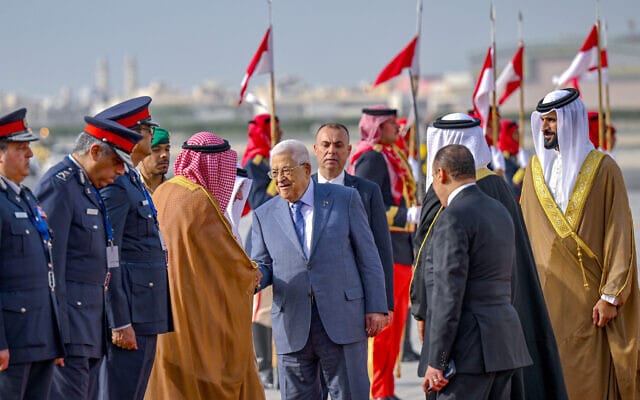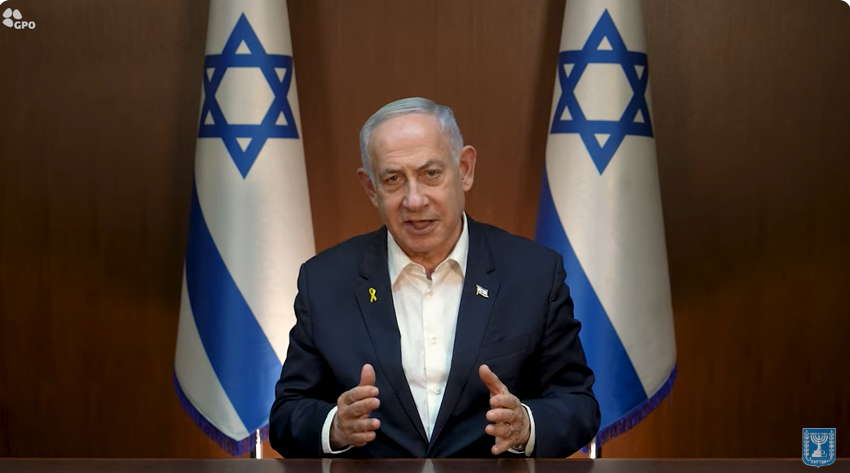The Palestinian Authority’s Condemnation of Saudi & Gulf States' Normalization with Israel: The Absurdities & Emerging Opportunities

The Palestinian Authority (PA) was formed by the 1993 Oslo Accords – a normalization process led by Yassir Arafat and Israeli Prime Minister Yitzhak Rabin. Without the Oslo Accords, there would be no Palestinian Authority. Yet, Palestinian President Mahmoud Abbas and all members of the PA openly oppose the Saudi and Gulf state normalization plan with Israel. They have openly opposed the Abraham Accords, which is no different from the Oslo Accords and have actively worked to undermine it. This article examines the fundamental elements of the PA’s efforts to block Saudi and Arab normalization with Israel, changing trends in the Middle East region, and possibilities for collaboration.
PA’s Actions to Undermine the Abraham Accords
In October 2020, Palestinian President Mahmoud Abbas slammed Sudan's new government when they announced their normalization deal with Israel.[1]. The PA assumed the position as the only mouthpiece of the Palestinian people. Thus, they condemned and rejected the normalization ties between Israel and Sudan, which was earlier announced by the then-president, Donald Trump.
Abbas’ condemnation of Sudan set the tone for further condemnations of the United Arab Emirates and Bahrain, who had normalized ties with Israel in a widely publicized event. Although Sudan is at war now and the position of their relationship with Israel is uncertain, the Palestinian move to condemn the normalization was seen as a default position.
By early 2021, the different Palestinian factions united under one banner to oppose Arab states' normalization of relations with Israel. This saw meetings between bitter rivals of Palestinian groups, Mahmoud Abbas (PA), Ismail Haniyeh (Hamas), and Ziyad Al Nakhala (Palestinian Islamic Jihad) uniting to condemn the Emirati and Bahraini normalization with Israel[2].
Mahmoud Abbas had taken a pragmatic stand in dealing with America before these normalizations commenced. He was always practical about taking the opportunity to work with the United States to seize the opportunities that came with it. In the first year after normalizing ties with Israel, trade between the UAE and Israel was over $2 billion, while Bahrain also recorded similar impressive figures[3].
However, after the October 7 attacks and Israel hit back very hard, universal opinions in the Islamic world swayed in favor of those who opposed normalization with Israel[4]. Till now, Mahmoud Abbas has not been able to condemn the terrorist attacks against Israel on October 7. Thus, the whole cycle of normalizing with Israel is on hold.
When the situation is viewed critically, it is apparent that certain things stand in the way of the logic of opposing normalization. Aside from the fact that Arab states are sovereign states and can align with anyone they desire, there are certain fundamental issues that require a second look at normalization.
PA Collaborates with Israel Every Single Day
Basically, the Oslo Accords require the PA to function like a sovereign state. This comes with various good-faith behavioral requirements for the Palestinian Authority. Thus, they collaborate with Israel in administration, security, energy and other vital elements needed to run Palestinian cities and communities.
If the PA has to work so much with the Israeli government, what moral grounds do they have to stop sovereign states like Saudi Arabia, United Arab Emirates, or Bahrain from doing the same with Israel?
Thus, states like the UAE have stood firm in pursuing their sovereign national agenda by collaborating with Israel as a partner. This is just in the same direction as the PA’s mutual relationship with Israel.
The PA’s Corruption Led to the Popularity of Hamas
The Palestinian Authority had many weaknesses that were not solved. This became loopholes for massive corruption that created a huge gap between the average Palestinian in PA-controlled areas and the elites in top positions in the Palestinian Authority. The absence of checks and balances can cause anyone to become corrupt. This played out in Iraq and Afghanistan where foreign aid was considered “free money” to be looted by the elites.
Corruption was the main reason Hamas became popular among the Palestinian masses. It only happened that in place of corruption, Hamas and other radical militant parties in Gaza and PA-controlled areas wanted to use the money to wage armed attacks on Israel.
Thus, Hamas also created artificial poverty. However, they cloaked it in a noble cause, which has ended up in the standoff in the current Gaza War.
Hence, there is the widely corrupt elitist PA willing to collaborate with Israel, while Hamas and other militant-minded Palestinian groups seek to use foreign aid to wage armed struggle against Israel.
The average Palestinian is put on the spot to choose one of these two. In Gaza, though, the choice of the PA was limited. Therefore, Hamas took the opportunity to launch the October 7 attacks, which have caused the Gazan civilians more suffering than could be inflicted under the most corrupt PA government committed to peaceful coexistence.
Arab States’ Demand for Accountability by the PA Construed as Hostile
Unlike Iran, which backs an armed Palestinian struggle against Israel as part of the export of their ideology and destabilization of the region, the Arab states have demanded more accountability and a chance to better the lives of Palestinians through foreign aid. A month before the October 7 attacks, Saudi talks aimed at normalizing ties showed two things:
1. Saudi Arabia was ready to help Palestinians as an inherent and inseparable part of any deal with Israel, and
2. They did not want to give money directly to the Palestinian Authority because of past incidents of the lack of accountability and corruption among their elites[5].
Instead, the Saudis sought to create a non-governmental organization that would provide aid directly to the Palestinian people to gain a better life individually and collectively. What this means is that the Saudi and Arab commitment to the Palestinians is solid. However, they do not want to work with the PA, which they have condemned significantly in the past for corruption.
Collaborations, Interests & Changing Geopolitical Trends in the Region
When one puts the different components together, an armed struggle is not an option for the Palestinian people in the short- to medium-term. After the bitter experience of this deadly Gaza war, it is not likely that re-arming and fighting another guerilla war would be feasible amongst the Palestinians in the months to come.
Furthermore, Israel is poised to erase Hamas and other militant Palestinian groups at all costs. This includes political and military exclusion. Thus, the Palestinian Authority and what it stands for – collaboration with Israel will become the main path forward.
Iran’s expansionist agenda in the region will also bolster the Arab coexistence policy in relation to Israel. Therefore, this is the best time for collaboration between the Palestinian Authority and Israel.
Opposition and co-option will definitely be checked after Hamas launched this deadly war in Gaza. This gives the PA an opportunity to broaden its scope and create a decentralized governance system that will bring more opportunities, prosperity, and improvements to Palestinians.
Thus, an involvement with the Arab states will create better opportunities for more effective and efficient projects. This means a tripartite arrangement involving the PA, Israel, and the GCC can lead to a better method of building stronger state structures to give Palestinians more opportunities and possibilities.
Alternative For Arab States – Walk Away from Any Direct Involvement with the PA or Palestinians in General
Now that Hamas is out of the picture as an effective organization, the PA is not under the same pressure to launch foreign diplomatic efforts to stop normalization between Israel and the Arab states. Thus, it is a golden opportunity for the PA to act to promote normalization as opposed to blocking it.
If the PA does not pursue this, the Arab states can just go back to being dormant in dealing with the Palestinian issue. After all, they have no direct obligations towards them. And there are countless alibis to save face in their refusal to help the PA or Palestinian people. Thus, collaboration and cooperation are in the interests of the PAs and the Gulf States.
Conclusion
The PA collaborates with Israel every second. They, therefore, have no right to stop any sovereign state from normalizing ties with Israel. In the pre-October 7 era, the PA had to broker peace with Hamas and other militant groups to hold on to power. Thus, it can be said that they had no option but to actively discourage other Islamic countries from normalizing ties with Israel. However, now that Israel is poised to remove Hamas from the Palestinian leadership structure, the PA has a unique opportunity to improve probity and accountability while engaging with the Gulf states to collaborate with Israel for the best interest of Palestinians. This could be seen in the funding of programs that can improve the quality of life of Palestinians and build sustainable state structures that will help create and maintain lasting peace and prosperity for all.
[1] TOI Staff. "Abbas slams Israel-Sudan deal: 'No one can speak on behalf of Palestinians'" Published: October 23, 2020. Available at: https://www.timesofisrael.com/abbas-slams-Israel-sudan-deal-no-one-can-speak-on-behalf-of-palestinians/
[2] Adil Rasheed & Jatin Kumar. "Commentary 663: Palestinian Response to the Abraham Accords" Middle East Institute New Delhi. Published: January 28, 2021. Available at: www.mei.org.in/coomentary-663-Palestinian-response-to-the-Abraham-accords
[3] Clara Keuss. "Abbas Can’t Afford to Ignore the Abraham Accords" AEI. Published: August 5, 2022. Available at: https://www.aei.org/foreign-and-defense-policy/the-abraham-accords-arent-perfect-but-abbas-cant-afford-to-pass-them-up/
[4] Marc Daou. "The Abraham Accords: 'Palestinian leaders don't realize that the region is changing'" France24. Published: April 6, 2024. Available at: https://www.france24.com/en/middle-east/20230406-the-abraham-accords-palestinian-leaders-don-t-realise-that-the-region-is-changing
[5] Michael Pompeo & Sander Gerber. "The Corrupt Palestinian Authority Must Not Be a Part of Any Saudi-Israel Deal" Hudson Institute. Published: September 8, 2023. Available at: https://www.hudson.org/foreign-policy/corrupt-palestinian-authority-must-not-be-part-any-saudi-israel-deal-michael-pompeo




